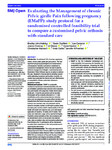Evaluating the Management of chronic Pelvic girdle Pain following pregnancy (EMaPP): study protocol for a randomised controlled feasibility trial to compare a customised pelvic orthosis with standard care
| dc.contributor.author | Halliday, B | |
| dc.date.accessioned | 2022-08-08T14:00:32Z | |
| dc.date.issued | 2022-08-05 | |
| dc.identifier.issn | 2044-6055 | |
| dc.identifier.issn | 2044-6055 | |
| dc.identifier.other | e063767 | |
| dc.identifier.uri | http://hdl.handle.net/10026.1/19517 | |
| dc.description.abstract |
introduction: An estimated 10% of women experience severe, chronic pelvic girdle pain post partum. This has significant physical, psychological and socioeconomic consequences. Typically, such pain is recalcitrant to conservative management; hence the need to identify effective management strategies. Customised Dynamic Elastomeric Fabric Orthoses may be an option to address this gap; designed to improve pain by providing support while optimising movement and function. Currently, no studies have evaluated the clinical and cost-effectiveness, or acceptability of these customised orthoses in postpartum women. Methods and analysis: EMaPP is a pragmatic, multicentre randomised controlled feasibility trial with an embedded qualitative study and economic evaluation. Sixty participants with pregnancy-related severe pelvic girdle pain >3 months post partum will be recruited. Participants will be randomly allocated in a 1:1 ratio (stratified by centre and presence/absence of lumbo-pelvic pain pre pregnancy) to receive either standard care (standardised information and exercise) or intervention (orthosis plus standard care). All participants will be asked to complete a battery of self-report questionnaires (including pain, function, health-related quality of life and health and social care resource use), via a web-based application at baseline, 12 weeks and 24 weeks. Pain levels and medication usage will be reported fortnightly. Feasibility and acceptability of the trial procedures will be determined in terms of recruitment and retention rates, data completion rates and intervention adherence. Five clinicians and 10 participants will be interviewed to explore their experiences of the trial procedures and receiving the intervention. Ethics and dissemination: This study was approved by: National Research Ethics Scheme (NRES Committee Health and Care Research Wales Research Ethics Committee (21/WM/0155) and University of Plymouth Faculty of Health Research Ethics and Integrity Committee (ref:2966). Results will be made available to participants, the funders, staff, general public and other researchers through a range of mechanisms. Trial status Currently recruiting. Trial registration number ISRCTN67232113. | |
| dc.format.extent | e063767-e063767 | |
| dc.language | en | |
| dc.language.iso | en | |
| dc.publisher | BMJ Publishing Group | |
| dc.subject | REHABILITATION MEDICINE | |
| dc.subject | PAIN MANAGEMENT | |
| dc.subject | Musculoskeletal disorders | |
| dc.title | Evaluating the Management of chronic Pelvic girdle Pain following pregnancy (EMaPP): study protocol for a randomised controlled feasibility trial to compare a customised pelvic orthosis with standard care | |
| dc.type | journal-article | |
| dc.type | Article | |
| plymouth.author-url | https://www.webofscience.com/api/gateway?GWVersion=2&SrcApp=PARTNER_APP&SrcAuth=LinksAMR&KeyUT=WOS:000839021200014&DestLinkType=FullRecord&DestApp=ALL_WOS&UsrCustomerID=11bb513d99f797142bcfeffcc58ea008 | |
| plymouth.issue | 8 | |
| plymouth.volume | 12 | |
| plymouth.publication-status | Published | |
| plymouth.journal | BMJ Open | |
| dc.identifier.doi | 10.1136/bmjopen-2022-063767 | |
| plymouth.organisational-group | /Plymouth | |
| plymouth.organisational-group | /Plymouth/Faculty of Health | |
| plymouth.organisational-group | /Plymouth/Users by role | |
| dcterms.dateAccepted | 2022-06-01 | |
| dc.rights.embargodate | 2022-8-27 | |
| dc.identifier.eissn | 2044-6055 | |
| dc.rights.embargoperiod | Not known | |
| rioxxterms.versionofrecord | 10.1136/bmjopen-2022-063767 | |
| rioxxterms.licenseref.uri | http://www.rioxx.net/licenses/all-rights-reserved | |
| rioxxterms.licenseref.startdate | 2022-08-05 | |
| rioxxterms.type | Journal Article/Review |


